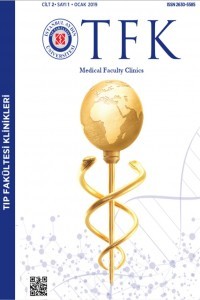Polikistik Over Sendromunda Metformin Kullanımı
Polikistik over sendromu (PCOS), kompleks ve heterojen özellik gösteren ve üreme çağındakikadınları en yaygın olarak etkileyen bir endokrinopatidir. Etyopatogenezi tam olarakaçıklanamamıştır. İnsülin rezistansı, hiperandrojenemi ve dislipidemi gibi multipl faktörlerileri sürülmüştür. PCOS’lu kadınlarda insülin rezistansı, kompansatuar hiperinsülinemi,hiperandrojenemi, ovulatuar bozukluklar, dislipidemi ve obesite gibi pekçok klinik vebiyokimyasal bozukluk görülebilmektedir. Sebebe yönelik kesin bir tedavi olmayıp,semptomlara, hastanın şikâyet ve isteklerine göre tedavi planı değişiklik göstermektedir. Hangiklinik etkiyi hedeflediğimize göre ve bireyden bireye değişiklik gösteren geniş bir tedaviseçeneği vardır. Günümüzde kullanılmakta olan ve yeni geliştirilen hiçbir farmakolojik ajan tümsemptomları giderememekte ve her hastada aynı sonucu vermemektedir. Metformin PCOS’aeşlik eden hemen tüm semptom ve bulguları iyileştirebilme potansiyeli ve oldukça geniş etkispektrumuyla PCOS da güçlü bir terapötik ajan gibi durmaktadır. Ancak Metformin ile yapılanbazı çalışmalarda sonuçlar birbiri ile uyumlu olmayıp, kafa karıştırıcıdır. PCOS’un heterojenyapısı, metformin doz ve sürelerinin çok farklı olması ve metformin taşıyıcı proteinlerdeki(OCT 1) genetik varyasyonlar metformine farklı klinik cevaplar oluşmasına yol açabilir.PCOS’lu kadınları klinik ve biyokimyasal parametrelere göre subgruplara ayırarak fenotiplerdetaylı olarak tanımlanmalıdır. Metforminin etkinliğinin tam olarak gösterilebilmesi için iyidizayn edilmiş, çok merkezli, prospektif çalışmalara ihtiyaç vardır. Güncel literatür taraması ilePCOS ve metformin ilişkisini özetlemek ve PCOS da metformin kullanımına yeniden dikkatçekmek bu derlemenin hedefini oluşturmaktadır.
Anahtar Kelimeler:
PCOS, metformin, heterojen, PCOS subgrubları, PCOS fenotipleri, OCT
Metformin Usage in Polycystic Over Syndrome
Polycystic ovary syndrome (PCOS), a heterogeneous and complex syndrome, is the mostcommon endocrinopathy that affects women during their reproductive years. Its etiopathogenesisis not completely elucidated and it has been proposed that there are multiple causative factorssuch as increased insulin resistance, dyslipidemia, and hyperandrogenemia. There have beenoften presented clinical and biochemical disorders such as insulin resistance, compensatoryhyperinsulinemia, hyperandrogenemia, obesity, ovulation disorders, infertility, dyslipidemiain women with PCOS. There is no definitive treatment for the cause, and the treatment planchanges according to symptoms and wishes of the patient. There is a wide range of treatmentoptions which varies depending on the individual and desired clinical effect we target. Nopharmacologic agent that is currently used and/or newly developed do relieve all symptomsand give the same result in every patient. Metformin appears to be a potent therapeutic agentin PCOS, with a potentially broad spectrum of effects that can cure almost all symptoms andsigns associated with PCOS. However, the results of some studies in which metformin is used,are not compatible and confusing. Different clinical responses to metformin in women with PCOS mayresult from heterogeneous nature of the PCOS phenotype, different dosage and duration of metformin andgenetic variation of OCT1 which is a metformin transporter protein. Dividing into subgroups accordingto clinical and biochemical parameters, phenotypes in women with PCOS needs to be described in detail.There is a need for multicenter, well-designed, prospective studies to accurately demonstrate the efficacy ofmetformin. To summarize the relationship between PCOS and metformin by looking over current literatureand to draw attention to the use of metformin in PCOS is the target of this review.
Keywords:
PCOS, metformin, heterogeneous, PCOS subgroups, PCOS phenotypes, OCT,
___
- 1. Rotterdam ESHRE/ASRM-Sponsored PCOS consensus workshop group. Revised 2003 consensus on diagnostic criteria and longterm health risks related to polycystic ovary syndrome (PCOS). Hum Reprod 2004;19: 41–7.
- 2. Al-Ruthia YS, Al-Mandeel H, AlSanawi H,.et al. Ovulation induction by metformin among obese versus non-obese women with polycystic ovary syndrome. Saudi Pharm J. 2017;25 (5): 795-800.
- 3. Bednarska S, Siejka A. The pathogenesis and treatment of polycystic ovary syndrome: What’s new? Adv Clin Exp Med. 2017;26(2): 359–367.
- 4. 2017 Royal College of Obstetricians and Gynaecologists RCOG Scientific Impact Paper No. 13 e307 of e313 Metformin therapy for the management of infertility in women with polycystic ovary syndrome.
- 5. Abu Hashim H, Foda O, Ghayaty E. Combined metformin-clomiphene in clomiphene-resistant polycystic ovary syndrome: a systematic review and meta-analysis of randomized controlled trials. Acta Obstet Gynecol Scand. 2015;94(9): 921-30.
- ISSN: 2630-5585
- Başlangıç: 2018
- Yayıncı: İstanbul Aydın Üniversitesi
Sayıdaki Diğer Makaleler
Metformin Yaşlanma Sürecini Yavaşlatabilir mi?
Olay İlişkili Potansiyeller (OİP)
Özer AKGÜL, Reyhan ÇALIŞKAN, Yaşar Ali ÖNER
Nutrigenomik: Genotipten Fenotipe Beslenme Etkisi
MikroRNA Polimorfizmleri ve Kanser
Patch Clamp Yönteminin Biyofiziksel Prensibi ve Tıpta Kullanımı
Dilek DÜZGÜN ERGÜN, Şefik DURSUN
Reyhan ÇALIŞKAN, Bekir KOCAZEYBEK
